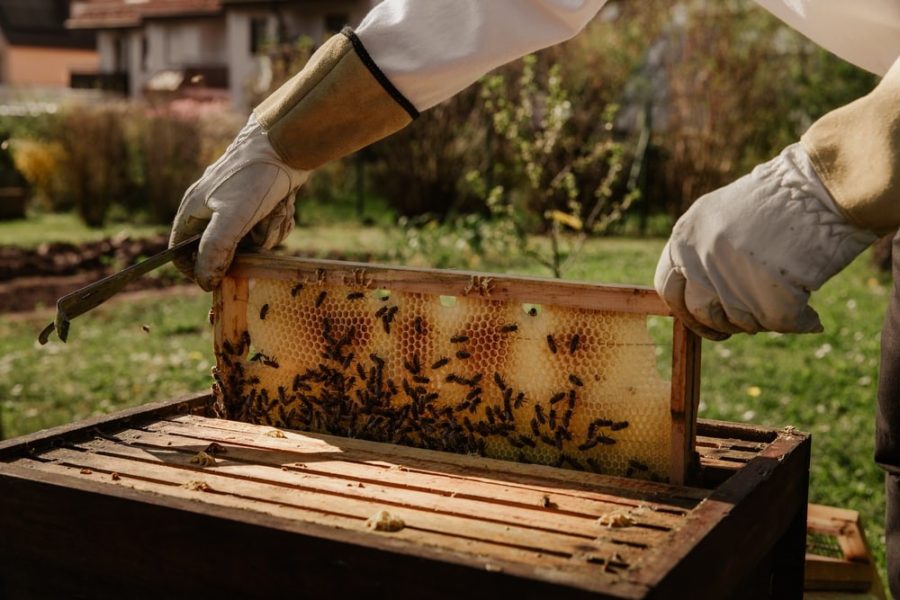Laughing in the Golden Years – Bee Keeper
June 30, 2022
LAUGHING IN THE GOLDEN YEARS
BEE KEEPER
By: Maryann Nunnally
My dad built a swing set for me using some old metal pipes and the crotch of a Box Elder tree just outside the kitchen door. I loved that swing and often took a sandwich out there to swing lazily while I ate my lunch. That year the flies that had plagued my mom every summer had disappeared with the DDT that had been liberally sprayed everywhere. So, I was really surprised when I became surrounded by hundreds of flies. I ran into the house to tell my parents that there were clouds of flies all around my swing set. Dad immediately went out to check, and in a few minutes, returned to say that the flies were actually a swarm of honey bees.
“Maryann,” he said to me, “how would like to raise some bees and get the honey that they make?”
All I needed to hear was the word honey, and I enthusiastically agreed. Dad explained that I would need to bring the swarm down. He went to the barn and returned with a small metal tub and grabbing a wooden spoon from my mother’s kitchen collection, he showed me how to beat the tub with the spoon in a steady, rhythmic way. Standing near the tree where the swarm was flying in a frenzied circle, I beat the metal tub.
Before dad left me to purchase a bee hive at the feed mill, he cautioned me not to stop beating the tub. He said, “The bees will come down on a limb of the tree if you keeping beating the tub. Maybe they think that it is thunder, but if you stop the noise, they will just keep flying around and probably leave to fly somewhere else.”
I kept hitting the tub, and in a few minutes the bees began to form a moving ball around one of the limbs of the Box Elder tree. By the time, dad returned with a hive and a light-colored piece of canvas, the swarm had settled down on the limb with only a few bees still flying around.
After laying the canvas on the ground under the tree limb and placing the hive on it, dad fetched a step ladder. Climbing up he took hold of the limb and gave it a quick snap. The results were an entire swarm of bees down on the canvas.
“Now,” dad explained to me, “if the queen goes into the hive, all the worker bees will follow her.”
I looked in vain for the queen but I never saw her. However, she must have entered the hive because in a few minutes all the bees had followed in, and I had my first active bee hive.
“When can I get the honey?” I asked dad.
Dad laughed and recited a little rhyme to me:
“A swarm of bees in June is worth a silver spoon; but a swarm of bees in July is not worth a fly.”
I had my first hive, but sadly I had to wait until the fall of the next year before I could harvest the honey. Soon I had a number of hives as people, when they heard that dad was helping me start a honey bee business, called him and asked him to come get the swarms that were in their yards or behind the clapboards of their homes. Within the next three years, we had about twenty-five hives and more honey than we could use ourselves. I was in business and often sold my excess honey to our little country store.
Fast forward ten years when I had left home to attend college, my dad called me and said my mother had been stung by one of my bees and was in the hospital with a life-threatening allergic reaction. “We need to sell the bees,” he said.
Enter Mr. Al, a WWII German prisoner who elected to stay in the United States, and start his own farm. When Mr. Al heard that dad was selling my bees, he offered to buy them, and dad charged him five dollars a hive and threw in the bee keeper’s outfit. In early winter, Mr. Al retrieved the hives by loading them into the back of his rickety truck and took them home. Everyone was satisfied, and I put the bee keeping business out of my head.
The next spring my dad called me at my job on campus and said, “Wait till I tell you what Mr. Al did.”
It seemed that Mr. Al did not understand that bees can live through a bitter cold northern winter and took all his new hives home and put them in his cellar to keep them from freezing. In the spring the bees became active and soon his whole house was full of angry bees trying to escape. Mr. Al came to get my dad to help him. My father could not stop laughing, as he told me that he opened every door and window in Mr. Al’s house and helped him carry all the hives from the cellar to a near-by field. Soon all the house-bound bees left their prison and returned to the hives, and Mr. Al was free to learn that bees create their own heating system in a winter hive and live just fine no matter how cold it gets.
As for me, I now get my honey from the supermarket, and it pleases me just fine.
Maryann K. Nunnally
Wilmington, NC




















